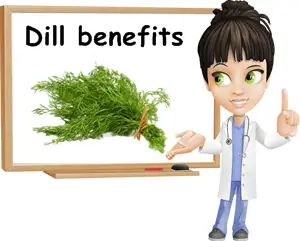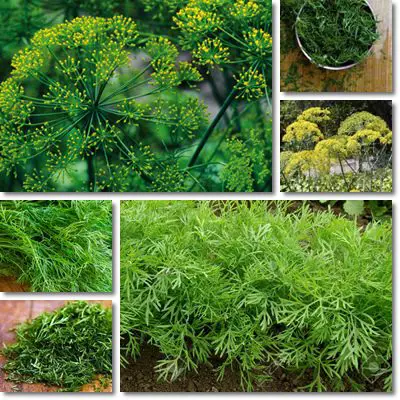Related to carrots, celery, parsley, parsnip and numerous other vegetables and culinary herbs from the Apiaceae family, dill (Anethum graveolens) is a wonderful aromatic herb and a rich source of essential nutrients, namely vitamins B1, B2, B3, B6, folate and vitamin C as well as calcium, copper, iron, magnesium, manganese, phosphorus, potassium and zinc. Both fresh and dried dill leaves are extremely nutritious and contribute greatly to keeping us in good health.
Dill essential oil, concentrating all the biologically active chemical constituents of the herb, possesses additional antimicrobial, antifungal and anti-inflammatory properties. Nevertheless, the herb is best consumed fresh because cooking heat or other forms of preparation can and will influence its nutritional value and health effects.

What does dill look like?
Dill is a garden herb that grows up to 50-80 cm in height. Each plant has several hollow, branched green stems with tiny, needle-like, deep green, feathery leaves ranging from 5 to 20 cm in length. The uppermost leaves are the smallest. If left to flower, dill plants will produce tiny, yellowish flowers at the top of fine green stalks, arranged in the form of an either flat or rounded umbrella. To be honest, to me, flowering dill plants look somewhat like fireworks, while dill leaves remind me of fennel fuzz.
What does dill taste and smell like?
Dill has a unique flavor, quite difficult to put into words. The fresh leaves have a mildly sharp, green taste with a delicate, sweet crunch. Dried dill leaves are much more flavored and have a soft, anise-like taste.
Dill seeds taste and smell somewhat like caraway seeds, probably because both contain an essential oil called carvone. The leaves are often referred to as dill weed.
Fresh dill pairs well with all kinds of dishes that are complimented by a fresh, green, highly aromatic flavor profile – from soups and stews and salads to meat and fish based dishes (e.g. pork, salmon, cod) or vegetarian dishes rich in vegetables (e.g. ratatouille), and especially pickles and yogurt based or green sauces.
Add fresh chopped dill to potato salads, but also more familiar lettuce, cucumber and tomato salads. My absolute favorite dish that incorporates dill is cabbage and carrot salad with fresh, chopped dill: chop or grate a small white or green cabbage, add 3 medium-sized grated carrots, 3-4 spoons of cold pressed sunflower oil, 1-2 spoons of white vinegar, season plainly with salt and toss everything together with half a bunch of finely chopped, freshly picked dill.

What is dill good for?
Dill is at its healthiest fresh. Any form of cooking heat contributes to a more or less pronounced loss of vitamins and other nutrients, reducing its nutritional value and diminishing its beneficial health effects. Both essential nutrients, vitamins and minerals, and other bioactive naturally occurring chemical constituents contribute to the herb’s beneficial action on human health.
1) Dill is a great source of vitamin C
How much vitamin C in dill? Fresh dill contains 85 mg of vitamin C per 100 g, making it a great source of the nutrient. While it is meant to be consumed in small amounts, as a culinary herb rather than vegetable, sprinkling half a handful of the herb over a cucumber, tomato and lettuce salad can help up your daily intake of vitamin C.
More vitamin C in the diet is a source of health benefits such as lower inflammation levels in the body, stronger immunity and a better immune system response as well as antiaging benefits considering vitamin C boosts the production of collagen in the skin for a firmer, wrinkle-free and more youthful skin appearance.
2) Dill has a good content of several B vitamins
100 g of fresh dill contains generous amounts of almost all B vitamins, notably:
- Vitamin B1 or thiamine: 0.58 mg which is over 48% of total daily vitamin B1 values for an adult
- Vitamin B2 or riboflavin: 0.29 mg or 25% of daily requirements for the average adult
- Vitamin B3 or niacin: 1.57 mg which is a little over 10% of daily values for an adult
- Vitamin B5 or pantothenic acid: 0.4 mg out of 5 mg recommended daily intake
- Vitamin B6: 0.18 mg or around 15% of daily values for an adult
- Vitamin B9 or folate: 150 µg (micrograms) or about 35% of daily values for an adult
B vitamins are required by the body for good digestive health, and contribute to the synthesis of carbohydrates, an important step in producing energy for the body.
B vitamins are vital for healthy skin and hold important benefits for the brain and nervous system, helping support cognitive functions such as thinking, learning and memorizing.
3) Dill contributes to bone and cardiovascular health
Dill contains fairly generous amounts of calcium, phosphorus and magnesium, three essential nutrients for bone health. Calcium and phosphorus make up most of our actual bones and teeth, more specifically, the inorganic part of bone tissue. Both bone mineral density and bone strength rely heavily on getting enough calcium and phosphorus in the diet. Not just this, but calcium makes up tooth enamel and dentin in teeth.
Magnesium from dill both gets deposited in bones and teeth and ensures the calcium from food or dietary supplements is redirected to bones and teeth to make them stronger, helping build bone structure. Getting too much calcium and not enough magnesium in the diet causes calcium to build up in other areas of the body such as joints, blood vessel walls or heart valves where it may causes serious health problems in the long run.
4) Dill has antioxidant properties
Dill provides around 60% of the recommended daily allowance of manganese (1.3 mg per 100 g) as well as generous amounts of vitamin C (85 mg), both of which are powerful antioxidants.
Manganese for example is part of the innate antioxidant defense mechanism of the human body helping build the antioxidant enzyme superoxide dismutase which scavenges free radicals and prevents, reduces and repairs oxidative cell damage caused by them.
5) Dill is good for digestive health
Eating dill regularly can help improve intestinal transit time and prevent constipation by adding to the fiber intake of a person, but it works best when part of an overall balanced and varied diet considering the small amounts it is consumed in.
Preventing constipation is good for both physical and mental health. For one, good transit time and easy bowel movements can improve hemorrhoids problems.
Digestive health can also impact mental health – having regular and easy bowel movements can help build self-esteem and boost disposition.
However, it is important to stress the fact that, in the amounts it is meant to be consumed, the benefits of dill for constipation are modest at most.
Discover other herbs and spices that support digestive health and promote benefits such as constipation relief.
6) Dill has a natural anti-inflammatory action
According to research, carvone and limonene, two constituents in dill and its essential oil, have exhibited significant anti-inflammatory activity in animal models. Essential oil and extracts from the aerial parts and seeds possess the greatest anti-inflammatory power (The Study of Anti-Inflammatory Activity of Oil-Based Dill (Anethum graveolens L.) Extract Used Topically in Formalin-Induced Inflammation Male Rat Paw). Celery is also a great source of carvone.
7) Dill has natural antifungal and antimicrobial properties
Dill and dill essential oil have been found to inhibit the growth of molds and yeasts such as Candida albicans and Aspergillus species, both of which may cause potentially serious health problems. Naturally-occurring chemical constituents in dill and its essential oil, namely d-limonene and d-carvone, boast quite potent antimicrobial properties (‘Composition, quality control, and antimicrobial activity of the essential oil of long-time stored dill (Anethum graveolens L.) seeds from Bulgaria’). Limonene has also been found to possess impressive anticancer properties and is currently being used for the treatment of heartburn and acid reflux.
